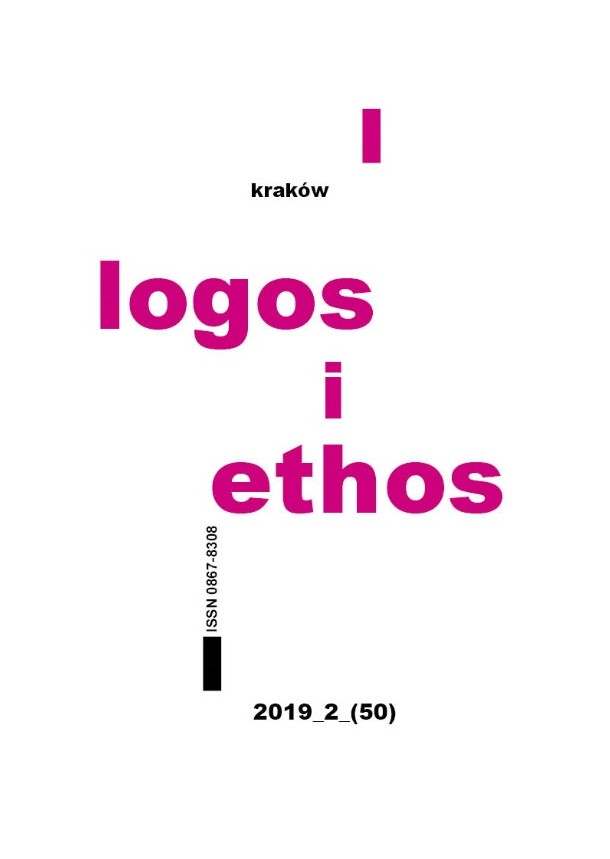Godność–wolność–miłość: struktura dynamizmu życia osobowego człowieka w ujęciu Karola Wojtyły
DOI:
https://doi.org/10.15633/lie.3475Słowa kluczowe:
Karol Wojtyła, osoba, godność, wolność, miłośćAbstrakt
Relacje zachodzące między godnością, wolnością a miłością w filozofii Karola Wojtyły mają ściśle określony porządek. Godność jest fundamentem wolności zarówno w sensie aksjologicznym, jak i ontologicznym. Godność wyznacza pole aksjologiczne dla wolności, a także wyraża doskonałość bytowania człowieka-osoby jako istoty rozumnej i wolnej. Kolejna relacja polega na tym, że wolność jest dla miłości, ponieważ dzięki wolności miłość jest możliwa – a jednocześnie miłość zabezpiecza wolność przed samowolą. Wreszcie miłość jest afirmacją godność, ponieważ tylko miłość może w pełni odpowiedzieć na wymagania stawiane przez godność osoby. Zatem porządek omawianych relacji można streścić w następujący sposób: wychodząc od godności, poprzez wolność i miłość, powraca się do godności.
Bibliografia
Biesaga T., Godność a wolność w antropologii Karola Wojtyły, w: Ku rozumieniu godności człowieka, red. G. Hołub, P. Duchliński, Kraków 2008, s. 65–76 (Studia z Bioetyki, 4).
Galarowicz J., Imię własne człowieka. Klucz do myśli i nauczania Karola Wojtyły – Jana Pawła II, Kraków 1996.
Galarowicz J., Paradoks egzystencji etycznej, t. 5, Kraków 2009 (Studia nad Myślą Jana Pawła II).
Hołub G., Kobiecość i męskość w spełnianiu osoby w ujęciu Karola Wojtyły, w: Wokół antropologii Karola Wojtyły, red. A. Maryniarczyk, P. Sulenta, P. Duma, Lublin 2016, s. 395–406.
Jałocho-Palicka M., Dobro i zło w dramacie poznania (W kręgu inspiracji Karola Wojtyły – Jana Pawła II), „Scripta Philosophica. Zeszyty naukowe doktorantów Wydziału Filozofii KUL” 2 (2013), s. 73–91.
Jan Paweł II, Pamięć i tożsamość. Rozmowy na przełomie tysiącleci, Kraków 2005.
Kant I., Uzasadnienie metafizyki moralności, Kęty 2017.
Pala A., Mistyka św. Jana od Krzyża w filozoficznej koncepcji miłości Karola Wojtyły?, „Logos i Ethos” 2017 nr 1, s. 139–157.
Szostek A., Od samostanowienia do daru z siebie i uczestnictwa. O Karola Wojtyły/Jana Pawła II koncepcji wolności, „Nauka” 2005 nr 3, s. 35–47.
Szostek A., Rola pojęcia godności w etyce, „Studia Filozoficzne” 1983 nr 8−9, s. 76–91.
Wojtyła K., Akt i przeżycie etyczne, w: Wykłady lubelskie, red. T. Styczeń, W. Chudy, J. W. Gałkowski, A. Rodziński, A. Szostek, Lublin 2006, s. 19–73.
Wojtyła K., Dobro i wartość, w: Wykłady lubelskie, red. T. Styczeń, W. Chudy, J. W. Gałkowski, A. Rodziński, A. Szostek, Lublin 2006, s. 75–178.
Wojtyła K., Elementarz etyczny, Lublin 1999.
Wojtyła K., Ewangeliczna zasada naśladowania. Nauka źródeł objawienia a system filozoficzny Maxa Schelera, w: Zagadnienie podmiotu moralności, red. T. Styczeń, J. W. Gałkowski, A. Rodziński, A. Szostek, Lublin 2001, s. 147–158.
Wojtyła K., Miłość i odpowiedzialność, Lublin 2001.
Wojtyła K., Osoba i czyn, w: „Osoba i czyn” oraz inne studia antropologiczne, red. T. Styczeń, W. Chudy, J. W. Gałkowski, A. Rodziński, A. Szostek, Lublin 2000, s. 43–338.
Wojtyła K., Osoba: podmiot i wspólnota, w: „Osoba i czyn” oraz inne studia antropologiczne, red. T. Styczeń, W. Chudy, J. W. Gałkowski, A. Rodziński, A. Szostek, Lublin 2000, s. 317–414.
Wojtyła K., Osobowa struktura samostanowienia, w: „Osoba i czyn” oraz inne studia antropologiczne, red. T. Styczeń, W. Chudy, J. W. Gałkowski, A. Rodziński, A. Szostek, Lublin 2000, s. 421–432.
Wojtyła K., Podmiotowość i „to, co nieredukowalne” w człowieku, w: „Osoba i czyn” oraz inne studia antropologiczne, red. T. Styczeń, W. Chudy, J. W. Gałkowski, A. Rodziński, A. Szostek, Lublin 2000, s. 433–444.
Wojtyła K., Problem oderwania przeżycia od aktu w etyce na tle poglądów Kanta i Schelera, w: Zagadnienie podmiotu moralności, red. T. Styczeń, J. W. Gałkowski, A. Rodziński, A. Szostek, Lublin 2001, s. 159–180.
Wojtyła K., Rozważania o istocie człowieka, Kraków 1999.
Wojtyła K., Zagadnienie woli w analizie aktu etycznego, w: Zagadnienie podmiotu moralności, red. T. Styczeń, J. W. Gałkowski, A. Rodziński, A. Szostek, Lublin 2001, s. 181–200 (Człowiek i Moralność, 2).
Wojtyła K., Znak, któremu sprzeciwiać się będą, Kraków 2005.
Pobrania
Opublikowane
Numer
Dział
Licencja
Autorzy publikujący w czasopiśmie udzielają jego wydawcy zgody o następującej treści:
- Autor zachowuje autorskie prawa majątkowe do utworu, a jednocześnie udziela wydawcy czasopisma zgody na jego pierwszą publikację w wersji drukowanej i wersji online na licencji Creative Commons Uznanie autorstwa 4.0 Międzynarodowe oraz zgody na wykonywanie opracowań, w tym przekładów.
- Autor ma możliwość udzielania zgody niewyłącznej na opublikowanie utworu w wersji, która ukazała się w czasopiśmie (np. zamieszczenia go w repozytorium instytucjonalnym lub opublikowania w książce), wraz z informacją o jego pierwszej publikacji w czasopiśmie.
- Autor może umieścić swój utwór online (np. w repozytorium instytucjonalnym lub na swojej stronie internetowej) jeszcze przed zgłoszeniem utworu do czasopisma.

